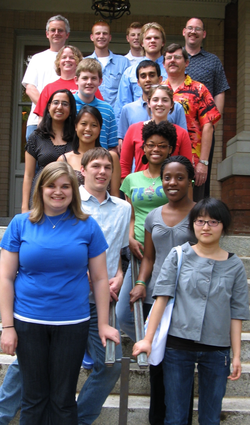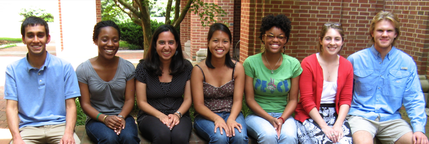Difference between revisions of "Missouri Western/Davidson iGEM2009"
From GcatWiki
Macampbell (talk | contribs) |
|||
| (17 intermediate revisions by 6 users not shown) | |||
| Line 1: | Line 1: | ||
This space will be used starting April, 2009 for brainstorming and a shared whiteboard space. | This space will be used starting April, 2009 for brainstorming and a shared whiteboard space. | ||
| − | [ | + | [[Davidson Protocols]] <br> |
| − | [ | + | [[MWSU_protocols]] <br> |
[http://gcat.davidson.edu/sybr-u/bmc.html BioMath Connections Page] <br> | [http://gcat.davidson.edu/sybr-u/bmc.html BioMath Connections Page] <br> | ||
| − | [http://gcat.davidson.edu/GCATalog | + | [http://gcat.davidson.edu/GCATalog GCAT-alog Freezer Stocks]<br> |
| + | [[Laboratory_Notebooks]] | ||
| + | <center> | ||
| + | == MWSU-Davidson 2009 iGEM team photo == | ||
| + | [[Image:iGEMTeam2009.png|250px|]]<br> | ||
| + | == The Davidson College part of the 2009 iGEM Team == | ||
| + | [[Image:DavidsonTeam2009.png|429px|]] | ||
| + | </center> | ||
| + | = [[iGEM 2009 Project]] = | ||
| + | [[Ladder problems]]<br> | ||
We need to learn more about these topics: | We need to learn more about these topics: | ||
<center>'''Biology-based'''</center> | <center>'''Biology-based'''</center> | ||
| + | #[[How do signal sequences/peptides work in bacteria, and how can we use them?]] | ||
#[[Plasmid Creation]] | #[[Plasmid Creation]] | ||
#[[What is msDNA?]] | #[[What is msDNA?]] | ||
| Line 32: | Line 42: | ||
#[[Could we have/use multiple synthetic organelles in a cell?]] | #[[Could we have/use multiple synthetic organelles in a cell?]] | ||
#[[What ideas from previous iGEM teams are useful to us?]] | #[[What ideas from previous iGEM teams are useful to us?]] | ||
| + | #[[Examples of Metabolic Pathways in E.coli]] | ||
Latest revision as of 16:38, 30 March 2011
This space will be used starting April, 2009 for brainstorming and a shared whiteboard space.
Davidson Protocols
MWSU_protocols
BioMath Connections Page
GCAT-alog Freezer Stocks
Laboratory_Notebooks
MWSU-Davidson 2009 iGEM team photo
The Davidson College part of the 2009 iGEM Team
iGEM 2009 Project
Ladder problems
We need to learn more about these topics:
- How do signal sequences/peptides work in bacteria, and how can we use them?
- Plasmid Creation
- What is msDNA?
- How is msDNA normally produced? Olivia/Alyndria
- How many copies are carried per cell? Alyndria
- What would we need to do to turn this into a BioBrick device? Romina
- How could we swap out msDNA sequences? Shamita
- What role can physical modeling of protein structure play in our project?
- What role can physical modeling of proteins play in our project? Eric Sawyer
- What other cool reporters are there? (Discrete On/Off or Continuous) Bryce Szczepanik
- Can we use promoter strength/opposite directions to subtract? Clif Davis
- Can we use suppressor tRNAs to encode logical operators (suppressor suppressor logic, SSL)?
- How is msDNA stored in E. coli? Olivia
- What is the sequence of bacterial reverse transcriptase and can we clone that gene? Shamita
- Can we redesign the normal msDNA pathway to produce new segments of DNA of our choosing? All
- What are other available reverse transcriptases? Leland
- What other math problems (e.g. NP- complete) are accessible to us? Annie Siya Sun
- What is the relationship between 3-SAT and map coloring? Ashley Schnoor
- What activators are there that turn on a promoter without any help?
- Can we use protein interactions to compute? (Post-translation, proteases, quaternary structure) Will Vernon
- Could we do something with clocks/counting?
- Could we have/use multiple synthetic organelles in a cell?
- What ideas from previous iGEM teams are useful to us?
- Examples of Metabolic Pathways in E.coli
- Can we get bacteria to solve a problem large enough to challenge a person?
- What interesting challenges or problems does origami offer?
- Can we produce a series of increasingly difficult goals that might be possible to produce in the lab?
- What has been done before and how can we improve upon that?
- We can perform some pilot experiments using synthesized DNA and later switch to msDNA (maybe).
- Can we address the Boolean Satisfiability (SAT) problem with a bacterial computer?
- How has 3SAT been addressed with a DNA computer? Can we use those methods?
- Can we get bacteria to solve a problem large enough to challenge a computer (probably not, but it is fun to think about)?
- What are some linear algebra applications for DNA origami?
- How can we use origami to solve 3-SAT problems?
- What constructs are we testing?
- What school districts do we have access to?
- Where is the Synthetic Biology page we want high school teachers to use after the survey?
- Do you need any more input from the veterans before the survey is ready?
Here is a link to the animation of the Hin/Hix system created by the "E. HOP living computer project folks.
Hin/Hix Animation

